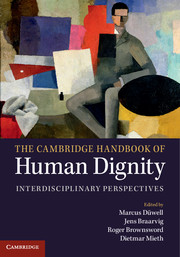Book contents
- Frontmatter
- Contents
- List of contributors
- Foreword
- Why a handbook on human dignity?
- Acknowledgments
- 1 Human dignity from a legal perspective
- 2 Human dignity: concepts, discussions, philosophical perspectives
- Part I Origins of the concept in European history
- Part II Beyond the scope of the European tradition
- Part III Systematic conceptualization
- Part IV Legal implementation
- Part V Conflicts and violence
- Part VI Contexts of justice
- 51 Human dignity and social welfare
- 52 Dignity and global justice
- 53 Human dignity and people with disabilities
- 54 Human dignity as a concept for the economy
- 55 Human dignity and gender inequalities
- 56 The rise and fall of freedom of online expression
- Part VII Biology and bioethics
- Appendix 1 Further reading
- Appendix 2 Universal Declaration of Human Rights
- Index
- References
54 - Human dignity as a concept for the economy
from Part VI - Contexts of justice
Published online by Cambridge University Press: 05 March 2015
- Frontmatter
- Contents
- List of contributors
- Foreword
- Why a handbook on human dignity?
- Acknowledgments
- 1 Human dignity from a legal perspective
- 2 Human dignity: concepts, discussions, philosophical perspectives
- Part I Origins of the concept in European history
- Part II Beyond the scope of the European tradition
- Part III Systematic conceptualization
- Part IV Legal implementation
- Part V Conflicts and violence
- Part VI Contexts of justice
- 51 Human dignity and social welfare
- 52 Dignity and global justice
- 53 Human dignity and people with disabilities
- 54 Human dignity as a concept for the economy
- 55 Human dignity and gender inequalities
- 56 The rise and fall of freedom of online expression
- Part VII Biology and bioethics
- Appendix 1 Further reading
- Appendix 2 Universal Declaration of Human Rights
- Index
- References
Summary
Two roles of dignity
The Universal Declaration of Human Rights (UDHR) affirms three types of universal economic rights. One concerns secure access to resources: everyone has a right to property (Article 17), including intellectual property (Article 27), to a decent standard of living (Article 25), to social security in case of accident, illness, disability, unemployment, widowhood and old age (Articles 22 and 25) and free education (Article 26). A second set of rights concern work: everyone has a right to work, to join a labour union, to a free choice of occupation, a just wage, equal pay for equal work, decent conditions of work (Article 23), and to limited working hours and paid holidays (Article 24). A third set of economic rights protect the vulnerable from specific injustices: everyone has a right against slavery and servitude (Article 4) and against discrimination on the basis of their race, gender, or other social identities (Articles 2 and 23). These economic rights are supposed to be specially connected to the dignity of human beings. What conception of dignity is capable of supporting the UDHR's list of economic rights?
- Type
- Chapter
- Information
- The Cambridge Handbook of Human DignityInterdisciplinary Perspectives, pp. 492 - 497Publisher: Cambridge University PressPrint publication year: 2014
References
- 8
- Cited by



